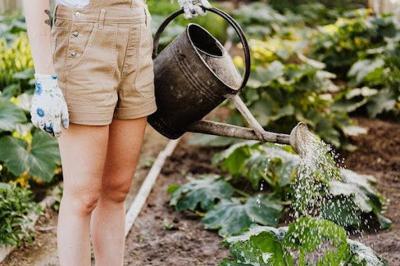The effort required to obtain a respectable-sized crop of backyard veggies and herbs may scare a novice gardener. However, cultivating an organic backyard garden may feed your family, benefit the environment, and be a fun weekend activity. As a result, in this article, we`ll cover the first steps you should take to be able to grow your first organic garden!
Start With Organic Mulch and Garden Soil
You need good soil to get a healthy organic garden going. Organic gardening products, such as compost, peat moss, or compost—the latter of which is the greatest choice since it includes decomposed microorganisms of former plant life—are the most significant component in soil. These microbes provide plants with the nutrition they need. You may make your compost pile by establishing a location or container where the organic waste will break down. A large garden may also allow you to buy it in bulk or use packaged compost from garden centers and home improvement retailers.
Adding one and two inches of mulch to the soil may reduce weeds. Weeds are shielded from sunlight and prevented from sprouting by the barrier it generates. This mulch layer also hinders the spread of fungal disease spores to plant leaves. Utilize an organic material, such as mulch, to help the soil by adding beneficial organic matter as it decomposes.
Use Organic Fertilizer for Your Garden
Your veggies will grow more quickly and produce greater quantities if you fertilize them. Well-rotted animal dung from animals that consume plants and readymade organic fertilizer purchased online or at your neighborhood garden shop are examples of organic fertilizers. Home improvement shops and garden centers also have a range of organic fertilizers.
If your soil is nutrient-dense, you may not need to add fertilizer. As a result, your plants may put on excessive lush, soft growth, which bugs enjoy.
Shopping Advice for Seeds
Extension service specialists advise picking plants with a healthy hue for the species without yellow leaves when buying seedlings. Do not pick up weary or drooping leaves. When purchasing transplants, carefully tap the plant out of the container to check the roots and ensure they are white and well-developed. Avoid plants that are flowering or have buds on them. Pinch off buds and blossoms before planting if you can't resist doing so to keep the plant's energy concentrated on growing new roots.
Raised Organic Beds
Raised plots are popular since they are easier on your back to maintain. So that you won't have to reach far or walk on the ground, they can be placed at your hands` level, making them easy to work on without discomfort.
Implement Crop Rotation
Since many strongly connected plants are susceptible to the same illnesses, avoid planting them in areas where their relatives thrived the previous year or two. The tomato group (tomatoes, peppers, potatoes, and eggplant) and the squash family are two of the largest families to be wary of (squash, pumpkin, cucumber, and watermelon). Rotating crops to various areas of the yard helps prevent the spread of disease and the depletion of soil nutrients.
Clean Up Your Garden
When foliage is dead and fallen, several illnesses may spread very quickly. Therefore, go around your garden once a week (or more frequently if possible) and gather any dropped leaves. Picking off an infected leaf may sometimes stop a disease from spreading across the whole plant. Put sick or dead leaves in the garbage rather than your compost pile.
Water Wisely and Provide Air to Plants
Wet leaves encourage mildew formation like powder or downy mildew, particularly in the afternoon or evening. Use a water-saving soaker hose that distributes water straight to the roots and eliminates splashing in place of overhead irrigation.
To prevent crowding, adhere to the seed packaging spacing instructions. Many different fungi-related illnesses may be halted with enough airflow between the plants.
The Bottom Line
Even a little garden or an indoor herb box is a move in the right direction if access to fresh food with the most nutrients is a goal. Moving towards an organic garden may also be an excellent idea for your diet. Moreover, the garden products that you eat don't need to be canned. Many of them may be placed in the freezer (or eaten right away!). As such, you can ensure that your harvest does not spoil and retains its organic flavor.


(0) comments
We welcome your comments
Log In
Post a comment as Guest
Keep it Clean. Please avoid obscene, vulgar, lewd, racist or sexually-oriented language.
PLEASE TURN OFF YOUR CAPS LOCK.
Don't Threaten. Threats of harming another person will not be tolerated.
Be Truthful. Don't knowingly lie about anyone or anything.
Be Nice. No racism, sexism or any sort of -ism that is degrading to another person.
Be Proactive. Use the 'Report' link on each comment to let us know of abusive posts.
Share with Us. We'd love to hear eyewitness accounts, the history behind an article.